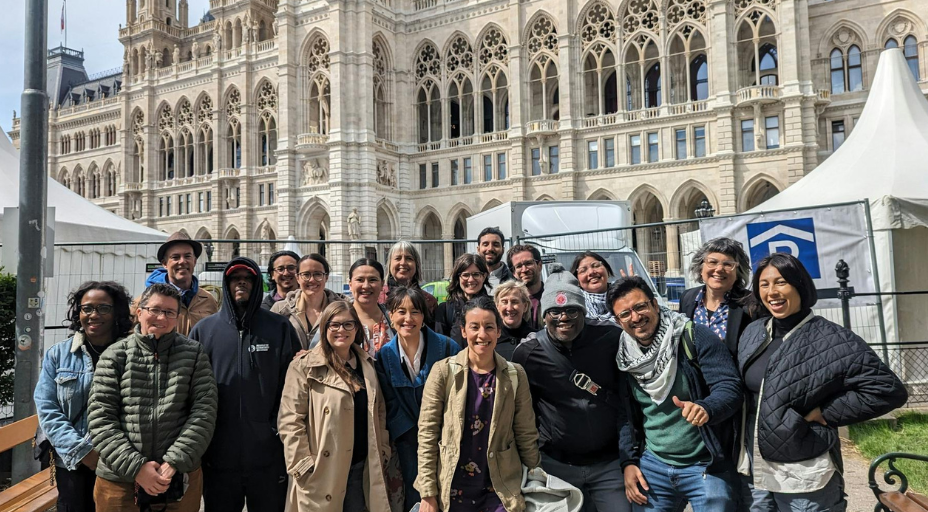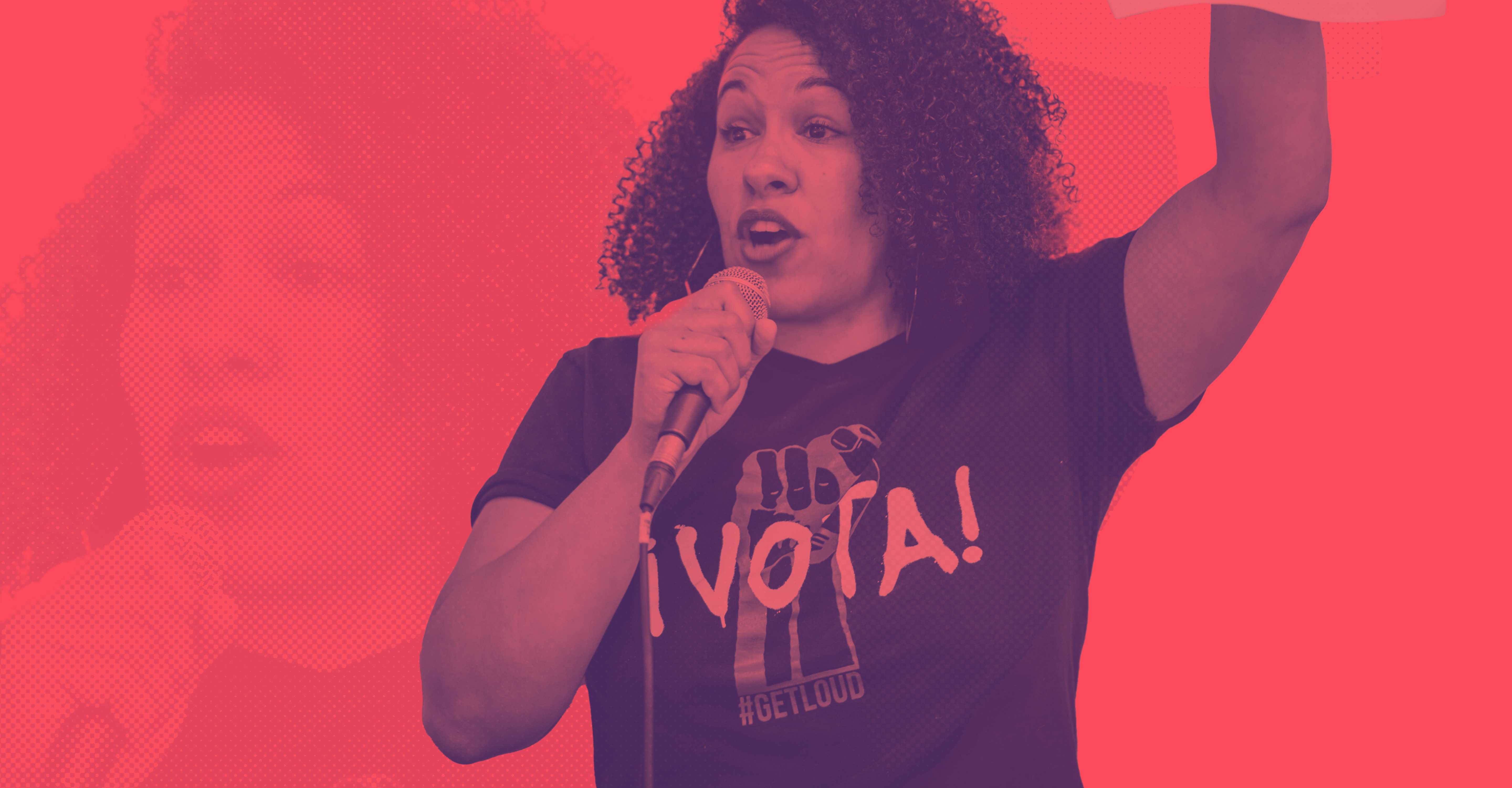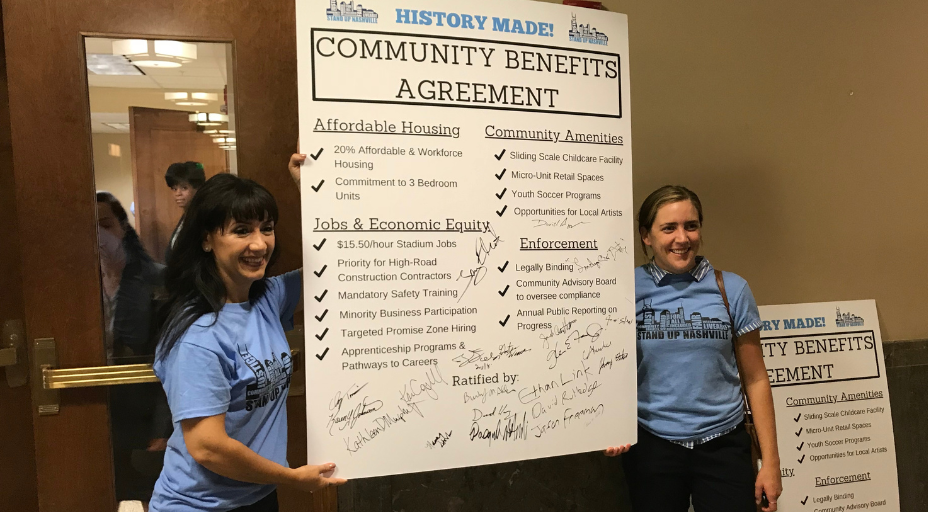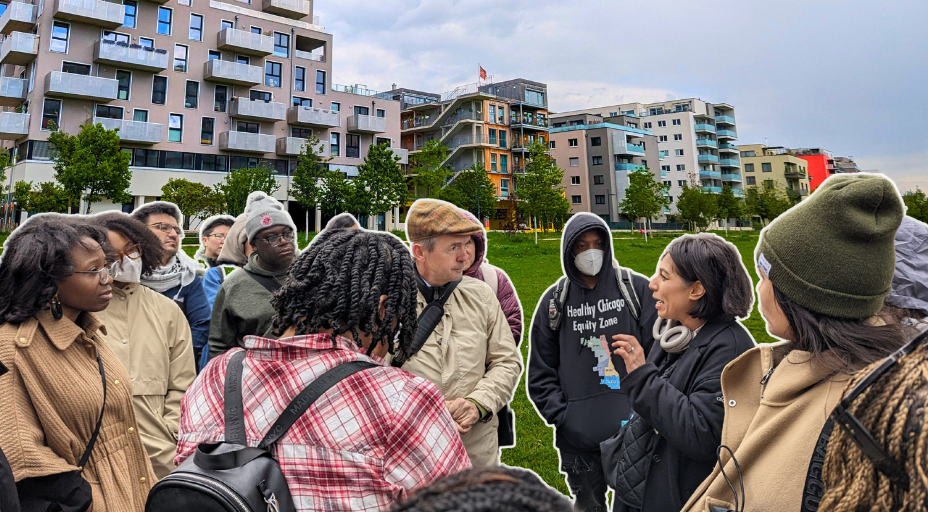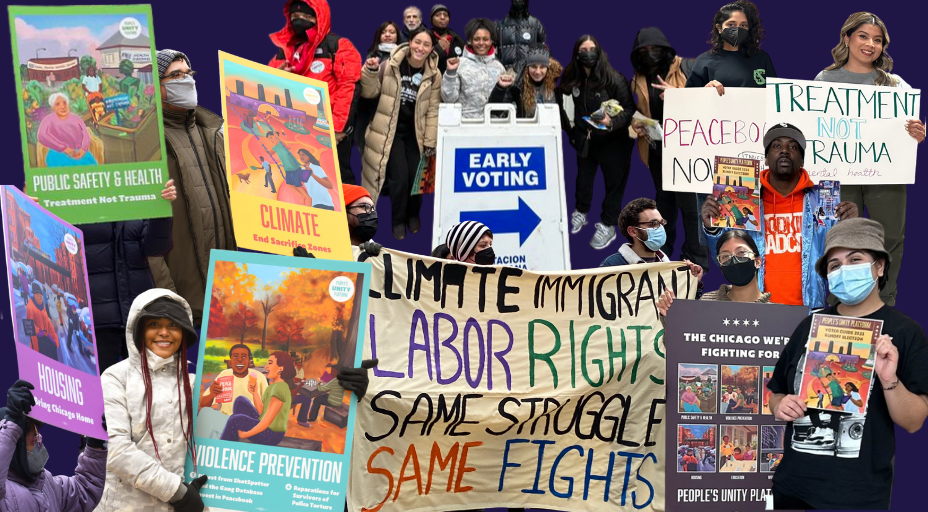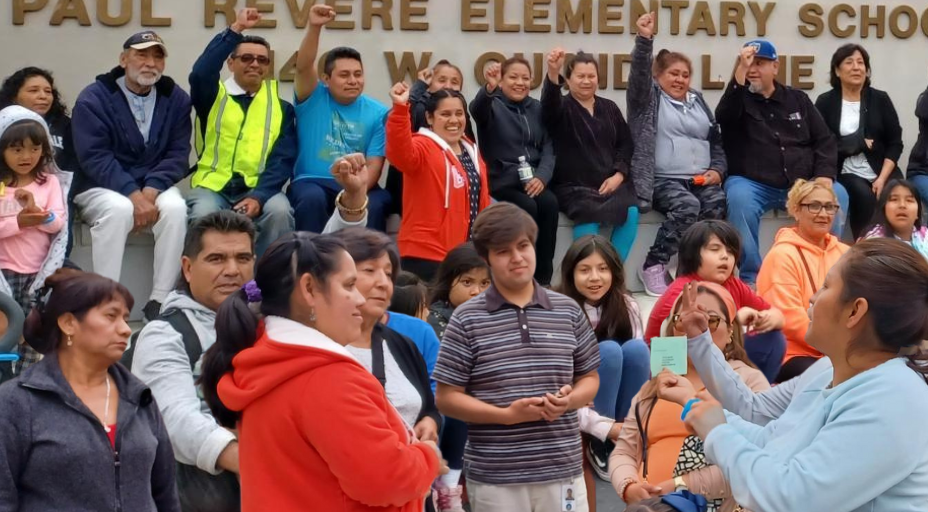By Christina Rosales, Housing and Land Justice Director
Earlier this year we brought a delegation of housing organizers and elected leaders from across the country on a trip to Vienna and Berlin to learn about community-controlled housing models. After meeting with city officials and tenant organizers, touring different social housing projects, and gaining practical guidance, we returned home with three big lessons:
- Put land in public hands
- Let people govern it
- Make it high quality and beautiful
Months later, the folks who came with us to Vienna and Berlin are putting those lessons into practice across our network. Here are some of their reflections from the trip and updates from campaigns they’re working on in their cities:
Laying the groundwork for social housing in Chicago
Our affiliate Grassroots Collaborative is a member of the Illinois Green New Deal (ILGND) Coalition, which helped to secure a $115-$135 million Green Social Housing Revolving Fund earlier this year. Santera Matthews, coordinator for the ILGND Coalition, joined our trip and noted how the experience gave her a deeper understanding of the power of municipalities to invest in the common good.
"This trip inspired our work to continue to push for green social housing in Illinois, ensuring sustainability and equity go hand-in-hand in our campaigns. We’re committed to building on these lessons to transform housing for all.” — Santera Matthews
In Santera’s words, “seeing the energy-efficient homes in Seestadt [a new neighborhood development on publicly-owned land] and hearing from campaigners fighting to expropriate Berlin’s largest landlord showed me what’s possible when communities build people power. This trip inspired our work to continue to push for green social housing in Illinois, ensuring sustainability and equity go hand-in-hand in our campaigns. We’re committed to building on these lessons to transform housing for all.”
Now, Grassroots Collaborative and the ILGND Coalition are building momentum around a set of policies and practices for implementing the social housing revolving fund that would ensure social housing is defined clearly as housing for public good. It would provide the community with control over who the housing is for, where it’s built, and ensure it stays affordable to the coalition’s base.
Going up against corporate landlords and real estate groups in Colorado
For the last year, United for a New Economy (UNE) has been educating members and coalition partners about the role of corporate greed in driving up rent prices. They have used strategic research and creative actions to help them make that connection. Instead of targeting elected leaders such as the governor or legislators, UNE has explicitly named the role of corporations and industry groups in blocking tenant protections. Earlier this year, after extensive advocacy, tenant organizing, and policy work, UNE helped to win For Cause Eviction, a major victory for renters across the state.
In Berlin, organizers with the Deutsche Wohnen & Co. enteignen (DWE) campaign shared how they have built a popular narrative that corporations are to blame for the city’s housing problems. Carmen Medrano, executive director at UNE, said the trip confirmed for her the importance of narrative strategy. In Vienna, government leaders and residents agree that everyone should live in high quality, healthy housing — as a result, policy is made in line with belief. In Berlin, DWE organizers have shaped a clear narrative that Berliners can hold corporations accountable and co-govern to make sure that housing meets their needs. “In Colorado, we’re focusing on the narrative that our communities need housing to thrive, that it can be beautiful, and that our policies and public dollars can and should support that,” said Carmen. Next for UNE is their ongoing fight to win a cap on rent increases from the largest, most influential corporate landlord in Colorado, Greystar, which can then set the standard for other landlords.
… and in California’s East Bay!
For years, our affiliate East Bay Alliance for a Sustainable Economy (EBASE) has been organizing to ensure that public land serves public good, from fighting for affordable housing to having a say in development projects that impact surrounding communities. They’ve supported tenant organizing efforts across the region, established a tenant union in Contra Costa County, and helped to win a Rent Stabilization and Just Cause Ordinance earlier this year in Concord. In Oakland, EBASE and the Oakland United Coalition have been mobilizing residents to ensure that the sale and development of the Oakland Coliseum is done with community input and feedback.
"Since coming back, we are doing more to educate ourselves on social housing and what it means for our context. We see an opportunity to advocate for affordable, community-owned housing at the Coliseum site.” — Kristi Laughlin
Kristi Laughlin, EBASE’s deputy director of campaigns, noted that Vienna shows what is possible for housing, neighborhoods, and cities when they’re designed to be beautiful, abundant, and centered around peoples’ needs. “It is amazing that almost 70% of the population in Vienna lives in some form of social housing, and that folks of diverse economic backgrounds all live together, achieving ‘social mixity’. I loved the value that Austrian leaders placed on social cohesion. They understood that having people from all walks of life live together and play together helps build bonds that ultimately strengthen social ties and democracy. Since coming back, here at EBASE we are doing more to educate ourselves on social housing and what it means for our context. We see an opportunity to advocate for affordable, community-owned housing at the Coliseum site."
Putting public land in public hands for transportation, housing, and more in Nashville
“People in Nashville are stressed the f#ck out,” said Michael Callahan-Kapoor, deputy director at our affiliate Stand Up Nashville (SUN). “I think a lot of it comes from trying to survive in a city that needs us, but doesn’t take our needs seriously.” Michael reflected on his time in Vienna and Berlin, noting that “it just feels different when people and their needs are at the center of a project’s planning, design, and investment decisions. Building mixed-income housing next to childcare, cultural spaces, pedestrian and bike paths, parks and playgrounds, small businesses that serve the community, transit hubs, and quality schools profoundly shifts the social cohesion of a neighborhood. We know things will look different [in Nashville], but experiencing this firsthand has broadened my horizon of what is possible as we work on repurposing public land for community needs and dreams."
"We know things will look different [in Nashville], but experiencing this firsthand has broadened my horizon of what is possible as we work on repurposing public land for community needs and dreams.” — Michael Callahan-Kapoor
SUN is a leading member of Shift Nashville, a newly formed coalition working to change how community needs are heard and prioritized, particularly when it comes to decisions around public land. The coalition is currently organizing around a transit referendum on the November ballot, which would overhaul the city’s transportation system and provide an unprecedented opportunity to invest in community priorities. Shift Nashville is focused on winning equitable access to a quality transportation system, but is also about community decision-making and control of public land. The coalition is pushing for community input on a development plan that would ensure affordable housing, good jobs, climate-resilient infrastructure, public green spaces, and more.
Transforming agricultural work with farmworker-led coops and land trusts
In California’s Ventura County, our affiliate Central Coast Alliance United for a Sustainable Economy (CAUSE) has been supporting farmworker organizing for years, helping to create a Farmworker Resource Program and fighting alongside leaders and workers to win a farmworker living wage. Now, in one of the country’s top agricultural regions, workers and organizers in Ventura are envisioning a new future for the industry, one that is restorative, just, and driven by farmworker-led cooperative and land trusts.
CAUSE, Líderes Campesinas, and Mixteco/Indigena Community Organizing Project have been working in partnership with farmworker leaders and advocacy groups to explore ways for farmworkers and communities to own and steward their land collectively. Their recent report highlights policy recommendations to achieve this vision, as well as the possible intersections between public conservation of land, sustainable farming methods, and healthy, thriving communities. Lucas Zucker, co-executive director at CAUSE, remarked that “Vienna showed us what is possible with political will and resources,” and that “Berlin reminded us to be bold, joyful, and push the boundaries of the ways our organizations are structured in the US to allow more organic leadership.”
Building the muscle and mechanisms for community stewardship of land in Seattle
Several years ago, recognizing the ongoing displacement of BIPOC communities in Seattle and King County as growing tech companies drew expensive development and highly-paid workers, Puget Sound Sage developed a framework and body of work around community stewardship of land (CSL). This framework calls for campaigns and policies that enable community groups to collectively own and steward land and housing. Christina Shimizu, executive director at Sage took inspiration from Vienna’s emphasis on using dedicated revenue to support its robust housing system. The Viennese model of housing associations building beautiful communities is similar to what Sage envisions for community stewardship of land.
“Seeing these neighborhoods reshaped my understanding of what is possible. Vienna shows us a road map for bold use of public lands and social housing that is both vibrant and community driven.” — Christina Shimizu
“We toured Vienna's neighborhoods by foot and public transit. Each neighborhood was well connected and designed around a vibrant public realm — open green spaces, some of the most inventive playgrounds I've ever seen, and frequent wayfinding along pedestrian and bike paths,” said Christina. "Seeing these neighborhoods reshaped my understanding of what is possible. Vienna shows us a road map for bold use of public lands and social housing that is both vibrant and community driven."
The CSL framework, which echoes values found in Vienna’s housing system, has shaped Sage’s work in developing and winning the creation of the Equitable Development Initiative for the City of Seattle and King County. These initiatives provide resources to community groups that are building housing and cultural spaces to help preserve community roots.
——
Our delegation to Vienna and Berlin left feeling inspired and energized, with a vision for a housing system designed with people and communities’ needs front and center. These lessons will continue to inform and show up in campaigns happening in cities all across our network. We know that community control of land and housing is central to our vision of multiracial feminist democracy and economies, where everyday people govern our shared resources and have a say in the decisions that impact our lives.
